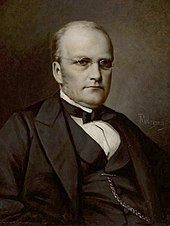This is an old revision of this page, as edited by Johnsoniensis (talk | contribs) at 06:52, 11 September 2020 (link rot). The present address (URL) is a permanent link to this revision, which may differ significantly from the current revision.
Revision as of 06:52, 11 September 2020 by Johnsoniensis (talk | contribs) (link rot)(diff) ← Previous revision | Latest revision (diff) | Newer revision → (diff)| This article uses bare URLs, which are uninformative and vulnerable to link rot. Please consider converting them to full citations to ensure the article remains verifiable and maintains a consistent citation style. Several templates and tools are available to assist in formatting, such as reFill (documentation) and Citation bot (documentation). (Learn how and when to remove this message) |

Stanisław Moniuszko (Polish pronunciation: [stãˈɲiswaf mɔ̃ˈɲuʃkɔ]; May 5, 1819, Ubiel, Minsk Governorate – June 4, 1872, Warsaw, Congress Poland) was a Polish composer, conductor and teacher. He wrote many popular art songs and operas, and his music is filled with patriotic folk themes of the peoples of the former Polish-Lithuanian Commonwealth (predominantly the Poles, Lithuanians and Belarusians). Since the 1990s Stanisław Moniuszko is being recognized in Belarus as an important figure of Belarusian culture. Moniuszko's operas are regularly performed at the Belarusian National Opera. There is a Museum of Stanisław Moniuszko.

He is generally referred to as "the father of Polish national opera".
Works
Moniuszko's series of twelve song books is also notable, containing songs to the words of Adam Mickiewicz, Antoni Edward Odyniec, and Józef Ignacy Kraszewski.
An English version of Straszny dwór (The Haunted Manor) was created and premiered by the student operatic society at Bristol university in 1970; this version has been performed since, specifically in 2001 by Opera South, which company also presented the world premiere of a specially created new English version of Verbum Nobile in 2002.
Moniuszko's opera Flis (The Raftsman) was performed and recorded in the Wielki Theatre of Polish National Opera at the 2019 Chopin and his Europe International Music Festival, marking the 200th anniversary of Moniuszko's birth. Another opera by him is The Haunted Castle.
References
- Аляксей Хадыка (22 May 2009). "Станіслаў Манюшка — паляк, літвін..." [Stanislaw Moniuszko – Pole and Lithuanian] (in Belarusian). Archived from the original on July 27, 2011. Retrieved 2013-01-20. NovyChas.org, Culture. Retrieved from the Internet Archive, February 18, 2013.
- "Праправнучка Станислава Монюшко: 'В Минске должен появиться памятник композитору' " by Кастусь Лашкевич , 19 Oktober 2009, Tut.By (in Belarusian)
- Stanisław Moniuszko Museum, Belarus
- http://www.poland.us/strona,13,4021,0,stanislaw-moniuszko-ojciec-polskiej-opery.html
- "Festiwal "Chopin i jego Europa"" [Chopin and his Europe]. Fryderyk Chopin Institute (in Polish). 2019. Retrieved 13 August 2020.
- "Opera: Moniuszko's Haunted Castle"; by Bernard Holland, The New York Times, 23 April 1986
External links
- Free scores by Stanisław Moniuszko at the International Music Score Library Project (IMSLP)
- Free scores by Stanisław Moniuszko in the Choral Public Domain Library (ChoralWiki)
- List of works, lieder.net
- "Stanisław Moniuszko", biography, list of works, Polish Music Center, University of Southern California
- How Family Shaped the Father of Polish Opera
- The Lesser Known Faces of Stanisław Moniuszko
- Sound examples and discussion of String Quartet No. 1 and No. 2, editionsilvertrust.com
You can help expand this article with text translated from the corresponding article in Polish. Click for important translation instructions.
|
| Stanisław Moniuszko | |
|---|---|
| List of compositions | |
| Operas |
|
| Musical nationalism | |
|---|---|
| Europe |
|
| Americas |
|
- 1819 births
- 1872 deaths
- 19th-century classical composers
- 19th-century conductors (music)
- 19th-century male musicians
- 19th-century organists
- Belarusian composers
- Burials at Powązki Cemetery
- Chopin University of Music faculty
- Male conductors (music)
- Male opera composers
- Male organists
- People from Chervyen District
- People from Igumensky Uyezd
- Polish classical composers
- Polish classical organists
- Polish conductors (music)
- Polish male classical composers
- Polish opera composers
- Polish people of Armenian descent
- Polish Romantic composers